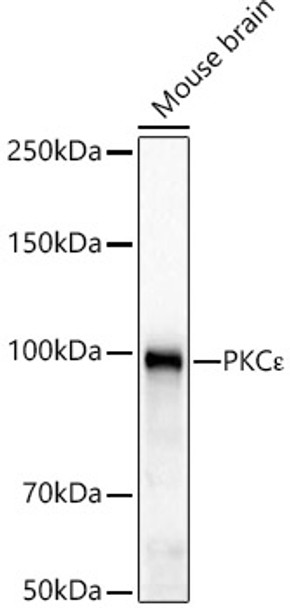Description
PKCε Monoclonal Antibody (CAB23690)
The PKC Monoclonal Antibody is a valuable tool for researchers studying protein kinase C (PKC), a family of enzymes involved in various cellular processes, including cell growth, differentiation, and apoptosis. This monoclonal antibody, produced in mice, specifically targets PKC in human samples and is validated for use in immunofluorescence and immunohistochemistry applications.PKC is a key player in signal transduction pathways and has been linked to a range of diseases, including cancer, cardiovascular disease, and neurological disorders. By targeting PKC with this monoclonal antibody, researchers can gain valuable insights into its role in disease pathogenesis and potential therapeutic interventions.
With its high specificity and reactivity, the PKC Monoclonal Antibody is a valuable tool for research in molecular biology, biochemistry, and pharmacology. It allows for the detection and analysis of PKC expression and localization in various cell types, providing important information for understanding the mechanisms underlying various diseases and developing targeted therapies.
| Product Name: | PKCε Monoclonal Antibody |
| Product Code: | CAB23690 |
| Reactivity: | Human, Mouse, Rat |
| Applications: | Western blotting |
| Host Species: | Rabbit |
| Purification Method: | Affinity purification |
| Isotype: | IgG |
| Clone No: | ARC61191 |
| Reactivity: | Human, Mouse, Rat |
| Tested Applications: | WB, ELISA |
| Key Applications: | Western blotting |
| Recommended Dilution: | WB 1:500-1:1000 |
| Storage Buffer: | Store at -20°C. Avoid freeze / thaw cycles.Buffer: PBS with 0.05% proclin300, 0.05% BSA, 50% glycerol, pH7.3. |
| Positive Samples: | SH-SY5Y, Mouse brain |
| Cellular Location: | Cell membrane, Cytoplasm, Nucleus, cytoskeleton, perinuclear region |
Protein kinase C (PKC) is a family of serine- and threonine-specific protein kinases that can be activated by calcium and the second messenger diacylglycerol. PKC family members phosphorylate a wide variety of protein targets and are known to be involved in diverse cellular signaling pathways. PKC family members also serve as major receptors for phorbol esters, a class of tumor promoters. Each member of the PKC family has a specific expression profile and is believed to play a distinct role in cells. The protein encoded by this gene is one of the PKC family members. This kinase has been shown to be involved in many different cellular functions, such as neuron channel activation, apoptosis, cardioprotection from ischemia, heat shock response, as well as insulin exocytosis. Knockout studies in mice suggest that this kinase is important for lipopolysaccharide (LPS)-mediated signaling in activated macrophages and may also play a role in controlling anxiety-like behavior.
| Immunogen: | Recombinant protein of human PKCε |
| Sequence: | Email for sequence |
| Synonyms: | PKCE, nPKC-epsilon |
| Calculated MW: | 84kDa |
| Observed MW: | 90kDa |

